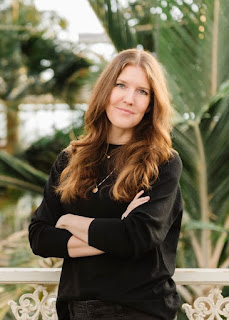Lene Fogelberg is the author of the new young adult novel The Lightning Tree, the first in The Natural Intelligence Revolution trilogy. She also has written the memoir Beautiful Affliction, and her work has appeared in a variety of publications, including The Huffington Post and Writer's Digest. She lives in Sweden.
Q: What inspired you to write The Lightning Tree, and how did you create your character Flora?
A: I love being in nature, and all of my life I have enjoyed going for walks in the woods and by the sea.
When we lived in Southeast Asia we went for hikes in the jungle where I often pondered what it would take for mankind to take deforestation and climate change even more seriously.
And then it hit me: what if nature started to strike back? I looked at the huge trees surrounding us, and the idea for The Natural Intelligence Revolution started to take form in my mind.
The main character, Flora Reed, came to me around the same time that the plot emerged in my mind.
I wanted to really connect with the reader, the way Flora connects with nature, and I knew she had to be sensitive and vulnerable but at the same time strong-minded and full of conviction that stems from her compassionate heart.
At the young age of 17, she has already experienced deep heartbreak and grief, and she taps into these emotions to find the strength she needs to tackle the mind-boggling changes to the world that she is the first to perceive.
Q: Did you know how the novel would end before you started writing it, or did you make many changes along the way?
A: I mapped out the story pretty much before I started to write. I did a lot of research. But at the same time, I was eager to start writing, and kept doing research while I worked on the book and consequently had to make some changes as I went along.
I loved writing books two and three, where I could tie it all together and answer all the questions raised in book one. But it was a bittersweet moment writing “the end” when I finished book three. After spending so much time with these characters, I knew I would miss them!
Q: The chapters alternate between Flora's perspective and that of Fauna, her sister. How did you choose the book's structure?
A: Flora’s younger sister Fauna emerged as a second main character while I wrote the story. I felt that her perspective and experiences were so interesting, I just had to explore them more closely and share that with the reader.
That’s how I ended up with the book’s structure of alternating chapters. This allowed me to build suspense and deepen the understanding of what is going on, as well as add subtext when the reader gets a sense of the contact between the sisters.
Even though they are tragically separated, they develop some sort of contact through supernatural means, because they are so close in their hearts. They are a kind of metaphor for how close mankind and nature are; living side by side but not really communicating.
Even though Fauna’s chapters are the shortest, they were the hardest. To capture her voice, her pain, and her longing often brought me to tears.
Q: What do you hope readers take away from the story?
A: I hope I can share my love of nature, and that the book invites a dialogue about how we take care of our planet for future generations. I also hope that readers might take away something from Flora and her family, how they interact and deal with the dystopian realities that take place around them.
Writing The Natural Intelligence Revolution trilogy was a labour of love. A love of nature and humanity alike. It was also a way for me to channel my sorrow over mankind’s often brutal and cruel exploitation of our beautiful planet.
But most of all, it is a love letter of sorts, to nature, to the strength of today’s youth, and to the generations that come after us.
Q: What are you working on now?
A: The second and third books of The NI Revolution trilogy are already finished and I will support the book launches throughout 2022.
After that I’ll have more time for my next YA project, which will be a stand-alone novel with elements of magical realism as well. It is so much fun to write YA fiction, now I’m stuck!
Q: Anything else we should know?
A: I just want to say thank you for this thoughtful interview! I enjoyed your questions and appreciate your blog and how you support your fellow writers! I’m so glad you asked me to participate!
--Interview with Deborah Kalb


No comments:
Post a Comment